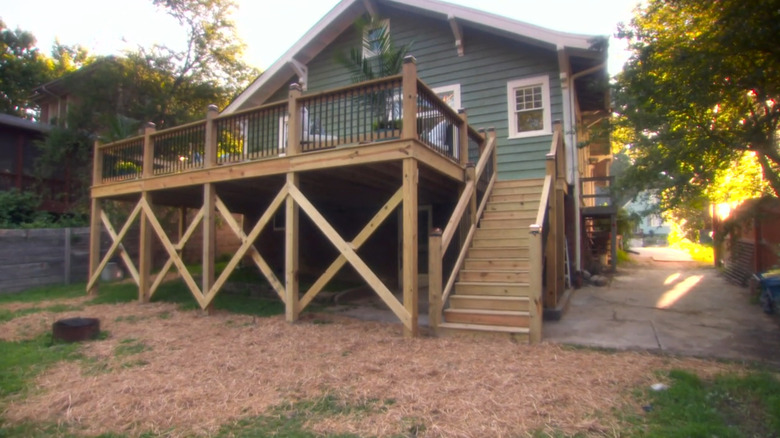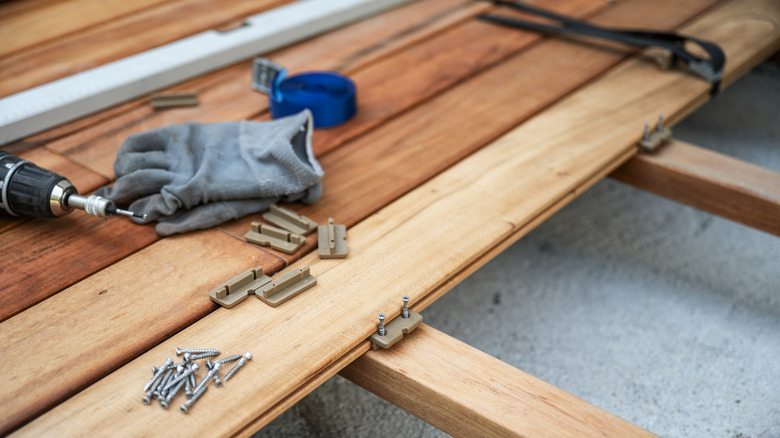How Hilary Farr's Backyard Renovation Idea Could Increase Your Home's Value
The best kinds of renovations are those that incorporate clever hacks to improve the value of your home. While you shouldn't only make updates thinking about the next buyer, it helps to first pour your money into improvements that could get you something back when you put your house on the market. Things like renovating kitchens or updating bathrooms have high ROIs, but you don't just have to focus on making the inside of your house sellable. You can also pick particular backyard renovations to make your home more attractive. That's exactly what Hilary Farr did in Season 12, Episode 3 of "Love It or List It" by building a second-floor deck that is accessible through the homeowners' office slash guestroom. Not only is it a large deck that they could entertain on, but it also has a staircase that makes it accessible from the backyard.
The homeowners originally requested the deck so they could have parties on it, and it's large enough to have multiple gathering stations. Specifically, there is one area with a table and another with couches. However, this isn't just a spot to lounge in. It also increased their home's value. "This is one of my favorite spaces too because we're adding space," Hilary says in the episode (via HGTV on YouTube) during the reveal. Here is a closer look into why it's so profitable.
Why building a deck can add value to your home
Prior to Farr's renovation, the home was valued at $265,000. The couple invested $85,000 into the upgrades, which increased the value to $370,000. This gives them a profit of $20,000, and the deck probably plays a role in that. That's because decks tend to have a very healthy return on investment (ROI). Angi lists the average ROI of a timber deck at 66%, which is right up there with a bathroom remodel, which has a 66.7% average ROI, according to a report by Remodeling. However, a deck is much more affordable to construct — on average, a midrange bathroom addition costs $24,606, whereas the national average cost of building a deck from scratch is just over $8,000, according to HomeAdvisor.
Decks and verandas increase home value for several reasons. The first is that they add an extra "room" to the house. They're an additional space you can gather or relax in and facilitate indoor/outdoor living. Just like the homeowners in the "Love It or List It" episode, you can use deck areas to host outdoor dinner parties and barbeques, especially if you create both a dining and sofa area. Secondly, spending time outside can bring a lot of happiness. If you can lounge or have a glass of wine outdoors, you might not have as great a need to go out, and may enjoy your time at home more.
Things to keep in mind while building a deck
If you want to take Farr's advice and build your own perfect deck in the backyard, there are a few things you should keep in mind. If you live in an area with an HOA, you will need to get their approval before you break ground. Typically, the HOA will have to weigh in on the size, materials used, and color of the structure. This will ensure that your intended addition will match the neighborhood standards. You will first have to submit a proposal to the board that outlines the details, blueprints, and specifications of the project (including who is building it). If you're not sure if your HOA needs to sign off on this particular project, double-check your Covenants, Conditions, and Restrictions (CC&Rs), which are the official rules of the association.
Once you have approval (or if you don't have an HOA,) you can move on to obtaining the necessary building permits. Check with your local government to see if you need permits for a deck, but as a general rule of thumb, most municipalities do. Sometimes decks that are under 200 square feet and less than 2 ½ feet off the ground don't need permits, but if you're building something more substantial, you will need your local planning authority to sign off on the project. This will ensure that your structure is safe, sturdy, and built with the local laws in mind, which is essential if you want to sell for a good price.



